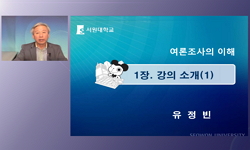Along with expansion of democracy, studies on correlation of the decision making process and public opinion has increased. Since the democratization of South Korea, public opinion emerged as an important variable in the foreign policy-making process. ...
http://chineseinput.net/에서 pinyin(병음)방식으로 중국어를 변환할 수 있습니다.
변환된 중국어를 복사하여 사용하시면 됩니다.
- 中文 을 입력하시려면 zhongwen을 입력하시고 space를누르시면됩니다.
- 北京 을 입력하시려면 beijing을 입력하시고 space를 누르시면 됩니다.
https://www.riss.kr/link?id=T14003988
- 저자
-
발행사항
서울 : 연세대학교 대학원, 2016
- 학위논문사항
-
발행연도
2016
-
작성언어
한국어
- 주제어
-
발행국(도시)
서울
-
기타서명
Bureaucratic politics and public opinion : foreign policy analysis on the agreement on the protection of classified information with Japan in 2012
-
형태사항
v, 104 p. : 삽화 ; 26 cm
-
일반주기명
지도교수: 김기정
- 소장기관
-
0
상세조회 -
0
다운로드
부가정보
다국어 초록 (Multilingual Abstract)
This paper analyze the decision making process of the Agreement on the Protection of Classified Information between Korea and Japan which was adjourned twice in 2012. Taking the perspective of Graham Allison’s bureaucracy model that foreign policy-making process is done through the negotiation game between actors, we assume the conflicts between government organizations are caused by negative framing which spark public opposition. We refer to the existing view of Allison’s bureaucracy model as an ‘interest mechanism’ and suggest a ‘fear mechanism’ as its complementary concept. In a similar fashion to the Allison’s “interest mechanism,’ the bureaucrats are triggered into the ‘fear mechanism’ because of their democratically accountability and responsiveness to the public opinion. When the bureaucratic organizations are thrust in to this ‘fear mechanism,’ conflicts become amplified, and the decision-making become difficult.
Along with expansion of democracy, studies on correlation of the decision making process and public opinion has increased. Since the democratization of South Korea, public opinion emerged as an important variable in the foreign policy-making process. The purpose of this paper is to reinterpret the political dynamics between public opinion and bureaucratic politics. The bureaucratic politics do not occur in a vacuum free from external factors. It is exposed to various environmental factors, and we are especially interested in examining how public opinion influences bureaucratic politics. Previous studies have assumed that the conflict of ‘interests’ between the bureaucratic organizations is essential to our understanding of the bureaucratic politics. As an alternative model, we try to explain that the conflict between the organizations is also based on ‘fear.’
This paper analyze the decision making process of the Agreement on the Protection of Classified Information between Korea and Japan which was adjourned twice in 2012. Taking the perspective of Graham Allison’s bureaucracy model that foreign policy-making process is done through the negotiation game between actors, we assume the conflicts between government organizations are caused by negative framing which spark public opposition. We refer to the existing view of Allison’s bureaucracy model as an ‘interest mechanism’ and suggest a ‘fear mechanism’ as its complementary concept. In a similar fashion to the Allison’s “interest mechanism,’ the bureaucrats are triggered into the ‘fear mechanism’ because of their democratically accountability and responsiveness to the public opinion. When the bureaucratic organizations are thrust in to this ‘fear mechanism,’ conflicts become amplified, and the decision-making become difficult.
국문 초록 (Abstract)
본 연구에서는 외교정책 결정과정이 행위자간의 협상게임을 통해 이루어 진다는 앨리슨의 관료정치 모델의 기본 관점을 바탕으로, 관료조직간의 협상게임의 과정에서 부정적 프레임으로 촉발된 여론이 미치는 영향력이 존재함을 가정하고, 그것이 정책결정과정에 어떻게 변화를 가져오는지 본다. 앨리슨이 주장한 조직의 이익을 바탕으로 한 정책조정과정을 ‘이익 매커니즘’이라 개념하고, 그것의 보완적 개념으로 ‘두려움 매커니즘’을 제시하였다. 관료조직이 가지는 두려움이라는 요소는 측정할 수 있는 실체를 가진 것이 아닌 감정적인 개념이라는 한계가 있다. 따라서 본 연구에서는 관료조직이 두려움을 느낄 때 나타나는 특정 행동을 두려움의 작용이라 설정하고 다섯 가지 지표를 제시하였다. 절차무시, 눈치보기, 책임회피, 상대측 비난, 꼬리자르기 행태가 그것이다. 이 요소를 사례에 적용하여 ‘두려움 매커니즘’의 작동을 확인한다. 또한, ‘두려움 매커니즘’의 촉발 요인으로는 관료의 민주적 책임성과 여론 민감성을 제시하였다. 언론의 부정적 프레임과 반대여론이 대규모로 존재하였을 때 관료의 민주적 책임성과 여론 민감성에 기인한 두려움이 차지하는 비중이 이익을 넘어서게 되고, 이는 조직간의 갈등을 증폭시켜 정책결정과정의 파행을 가져오게 된다는 것이 본 연구의 핵심이다.
분석 사례로는 2012년 한일정보보호협정 체결의 추진과정에 드러난 두 차례의 연기결정과정으로 선정하였다. 두 번의 연기과정을 통하여서, 여론의 부정적 프레임이 똑같이 존재한 상황에서 연기결정의 결과가 상이하게 나타난 것에 대한 변수로 관료조직이 가지는 여론 민감성과 시기적 요인에 의한 두려움 촉발이라는 것을 확인 한다. 이를 통해 외교정책 결정과정에서 관료정치와 여론의 역학관계를 ‘이익’만이 아닌 ‘두려움’의 요소로 접근하여 분석함으로써, 보완적 분석모델을 제시하고자 한다.
본 논문의 목적은 민주화 이후 한국의 외교정책 결정과정의 중요한 변수로 등장한 여론과 관료정치현상간의 정치적 역학관계를 재해석하는 것이다. 관료정치현상이 외부의 요소로부터 격...
본 논문의 목적은 민주화 이후 한국의 외교정책 결정과정의 중요한 변수로 등장한 여론과 관료정치현상간의 정치적 역학관계를 재해석하는 것이다. 관료정치현상이 외부의 요소로부터 격리된 채 진공적 상태에서 일어나는 것이 아니라 다양한 환경적 요소에 노출되어있다는 공간적 이해를 바탕으로 여론의 영향력을 본다. 또한, 관료정치모델을 조직간의 이익의 갈등과 대립의 산물로만 보는 기존 연구의 한계를 지적하고 ‘두려움’을 통해 조직간의 갈등을 설명해보는 시도를 하였다.
본 연구에서는 외교정책 결정과정이 행위자간의 협상게임을 통해 이루어 진다는 앨리슨의 관료정치 모델의 기본 관점을 바탕으로, 관료조직간의 협상게임의 과정에서 부정적 프레임으로 촉발된 여론이 미치는 영향력이 존재함을 가정하고, 그것이 정책결정과정에 어떻게 변화를 가져오는지 본다. 앨리슨이 주장한 조직의 이익을 바탕으로 한 정책조정과정을 ‘이익 매커니즘’이라 개념하고, 그것의 보완적 개념으로 ‘두려움 매커니즘’을 제시하였다. 관료조직이 가지는 두려움이라는 요소는 측정할 수 있는 실체를 가진 것이 아닌 감정적인 개념이라는 한계가 있다. 따라서 본 연구에서는 관료조직이 두려움을 느낄 때 나타나는 특정 행동을 두려움의 작용이라 설정하고 다섯 가지 지표를 제시하였다. 절차무시, 눈치보기, 책임회피, 상대측 비난, 꼬리자르기 행태가 그것이다. 이 요소를 사례에 적용하여 ‘두려움 매커니즘’의 작동을 확인한다. 또한, ‘두려움 매커니즘’의 촉발 요인으로는 관료의 민주적 책임성과 여론 민감성을 제시하였다. 언론의 부정적 프레임과 반대여론이 대규모로 존재하였을 때 관료의 민주적 책임성과 여론 민감성에 기인한 두려움이 차지하는 비중이 이익을 넘어서게 되고, 이는 조직간의 갈등을 증폭시켜 정책결정과정의 파행을 가져오게 된다는 것이 본 연구의 핵심이다.
분석 사례로는 2012년 한일정보보호협정 체결의 추진과정에 드러난 두 차례의 연기결정과정으로 선정하였다. 두 번의 연기과정을 통하여서, 여론의 부정적 프레임이 똑같이 존재한 상황에서 연기결정의 결과가 상이하게 나타난 것에 대한 변수로 관료조직이 가지는 여론 민감성과 시기적 요인에 의한 두려움 촉발이라는 것을 확인 한다. 이를 통해 외교정책 결정과정에서 관료정치와 여론의 역학관계를 ‘이익’만이 아닌 ‘두려움’의 요소로 접근하여 분석함으로써, 보완적 분석모델을 제시하고자 한다.












